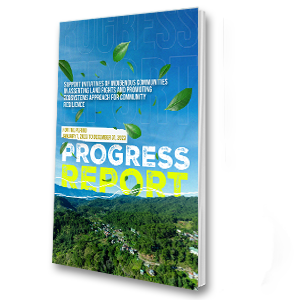pdf Support Initiatives of Indigenous Communities in Asserting Land Rights and Promoting Ecosystems Approach for Community Resilience - PROGRESS REPORT (Jan-Dec 2023)
207 downloads
Tebtebba Philippine National Program - PROGRESS REPORT - Jan-Dec 2023.pdf

Project Title: Support Initiatives of Indigenous Communities in Asserting Land Rights and Promoting Ecosystems Approach for Community Resilience
Progress Report for the Period: January 1, 2023 to December 31, 2023
Submitted by: Philippine National Program
Submitted to: SwedBio at Stockholm Resilience Centre (SRC)
Year 2023: Development Context
“Global efforts to mitigate the climate crises remains inadequate” according to State of Climate Action 2023. The World Meteorological Organization recorded 2023 as the hottest year in history. One expert designated the year as one characterized by an alarming surge in both the frequency and intensity of natural disasters, solidifying its status as a year marked by catastrophic events of a natural origin. Heatwaves, floods, droughts, wildfires and rapidly intensifying tropical cyclones harmed vital ecosystems and food sources, caused misery in the life of millions of people and inflicting many billions of dollars in economic losses. Humanitarian crisis worsened and needs such as water, food, dignity go unmet. December 10, 2023 marks the 75th anniversary. Its promise of dignity and equality in rights, has been under a sustained assault as the world faces numerous challenges, conflicts, exploding inequalities, climate change. Year 2023 crafted the Human Rights 75 initiative that seeks to shift the understanding and action towards greater knowledge of the universality of the UDHR so that collective action to achieve the values, and rights enshrined will leave anyone behind. Amidst these crises, countries came together in unprecedented ways to tackle the triple planetary crisis of climate change, nature and biodiversity loss, and pollution and waste. An environmental multilateralism led to landmark pacts to end chemical pollution and transition the world away from fossil fuels; the United Nations Environment Programme (UNEP) and partners launched the National Biodiversity Strategies and Action Plans Accelerator Partnership. The UN Climate Change Conference (COP28) with nearly 200 Parties came together with a decision to ratchet up climate action to keep the global temperature limit of 1.5°C within reach. In the Philippines, natural hazards and conflict affected more than 13.7 million people in 2023. While only 11 tropical cyclones (TC) entered the Philippines Area of Responsibility (PAR) from an average of 20, the country experienced heavy rains causing floods and landslides; a series of strong earthquakes in Mindanao that caused extensive damage to infrastructures, displacement of people and loss of lives. The year was also seen as the start of a strong El Niño. The Philippine economy faced multiple hurdles last year including soaring food prices and persistent supply chain bottlenecks. However, data shows that the Philippines economy has continued to show robust expansion, with GDP growth of 5.9% year-over-year (y/y) in the third quarter of 2023. This is due to fast growth in the manufacturing sector, sustained remittance inflows from workers abroad, fast-growing IT-BPO and the continued recovery of the tourism sector.

